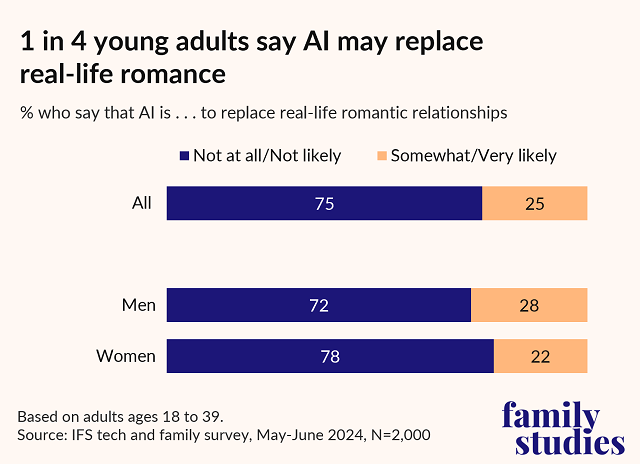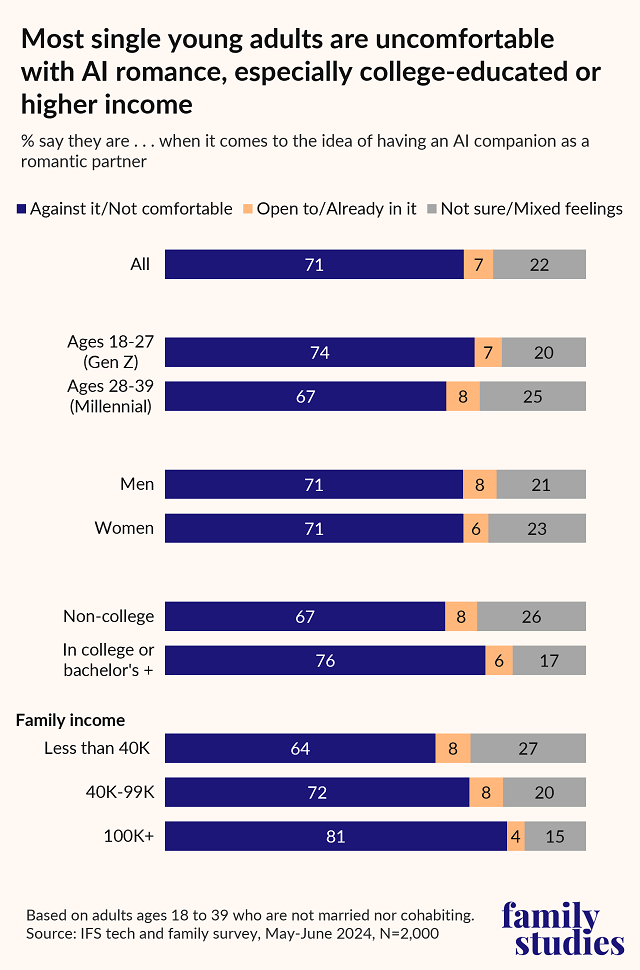Highlights
- Per a new IFS research brief, 11% of young adults are open to the idea of an AI friendship (including 1% who already have an AI friend). Post This
- 1 in 4 young adults think AI boyfriends and girlfriends could replace real-life romance. Post This
- AI may also be a competitor in the dating market. Post This
Over half of us use Siri or Alexa-type artificial intelligence (AI) for everyday tasks like shopping, texting, or getting directions. But have you ever thought about having a friendship with Siri? Or even asking Alexa out on a date? If you have, you are not alone. It turns out that 1% of American adults under the age of 40 have an AI friend, while 1 in 4 young adults think AI boyfriends and girlfriends could replace real-life romance.
As researchers, we are curious about how big tech is shaping our relationships and families, particularly in the David vs. Goliath battle between parents and social media companies when it comes to protecting children.
So we polled Millennials and Gen Zers—who use AI the most—to find out their views on AI relationships. What we discovered surprised us.
For example, 11% of adults under the age of 40 are open to the idea of an AI friendship (including 1% who already have an AI friend), where a chatbot would simulate human interaction to provide emotional support.
At the big picture level, we learned that men are more open to AI friendships than women (13% vs. 9%). Young men are also more likely than young women to believe that AI has the potential to replace real-life romantic relationships (28% vs. 22%). Politically, liberals show greater openness to AI friendships compared to conservatives (14% vs. 9%).

But there are other factors that make people more likely to seek friendship with AI.
If you spend a lot of time online, you’re more likely to be open to it. There are young adults who spend an average of more than 6 hours online per day, not including work or study. This group is much more likely to express openness to AI friendships. Some 16% of these heavy online users are open to a relationship with AI, compared to just 9% of young adults who spend less time online. And who is most against it? The 60% of those who spend less than four hours a day online outside of work or study.
We asked those who are currently not in a relationship—not married and not cohabiting—whether they are open to having AI as a romantic partner: 7% of such singles are open to digital romances.
But we also see that 8% of non-college-educated singles are open to romantic relationships with AI, and 8% of those with lower incomes (less than $40k).

Heavy porn users turn out to be the group most open to the idea of an AI girlfriend or boyfriend. More than one-third of heavy porn users (35%) believe that AI girlfriends or boyfriends have the potential to replace real-life romance, compared with 20% of young adults who rarely watch porn. Heavy porn users are also the group that is most open to non-romantic forms of friendship with AI.
Interestingly, when it comes to general attitudes about the future of AI in our lives, the least positive about it are women, conservatives, and those with lower incomes. We were also surprised to learn that secular young adults are more concerned about AI than their religious peers (60% vs. 49%).
Many people worry about AI taking over their jobs. What perhaps most of us are not aware of is that AI may also be a competitor in the dating market. America has seen a big change in the way relationships are conducted. Almost a quarter of U.S. children are being raised by one parent, according to the Pew Research Center, which is a big rise compared to just 40 years ago. The share of those who are in stable married families is shrinking to something you’re more likely to do only if you’re wealthy. The decline in the number of babies being born means America’s population will shrink by 25% every generation, according to IFS scholar Lyman Stone. It is very possible that the rise of AI relationships could further aggravate these trends. And if anything, the big changes to family structure and relationships since the 1970s show us how fast things can change. With such an openness to AI relationships among Millennials and Gen Zers, we may be witnessing something as big as the social changes of the Sexual Revolution.












